

Category:Software development philosophies. Empowering Public Wisdom. Skip to content NOW SERVING Psychedelic Culture Menu Search No products in the cart.
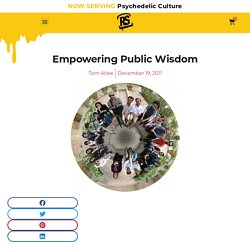
Phronesis. Phronēsis ( Greek : φρόνησις) is the Greek word for wisdom or intelligence which is a common topic of discussion in philosophy .
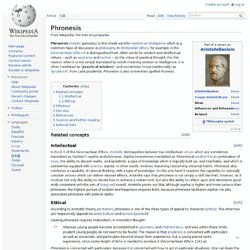
In Aristotelian Ethics , for example in the Nicomachean Ethics it is distinguished from other words for wisdom and intellectual virtues – such as episteme and techne – as the virtue of practical thought. For this reason, when it is not simply translated by words meaning wisdom or intelligence, it is often translated as " practical wisdom ", and sometimes (more traditionally) as " prudence ", from Latin prudentia . Phronesis is also sometimes spelled Fronesis . [ edit ] Related concepts. Category:Programming principles. TEDxCHUV - Henry Markram - Understanding the Human Brain: a test of global collaboration. Concept Mapping as a Tool for Group Problem Solving. Deliberatorium-intro.pdf (Objet application/pdf) PyBrain. TopQuadrant. OpenAi - - Creating the standard for Artificial Intelligence. How will we build an artificial human brain? Crowd computing. Crowdcomputing Eric Brown, co-author of "The Effective CIO", coined the term "Crowdcomputing" in 2009.[1][dubious ] It is an overarching term which defines the myriad of tools that enable idea sharing, non-hierarchical decision making and the full utilization of the world’s massive "cognitive surplus”-the ability of the world’s population to collaborate on large, sometimes global projects. [2] Crowd computing brings together the strengths of crowdsourcing, automation and machine learning.
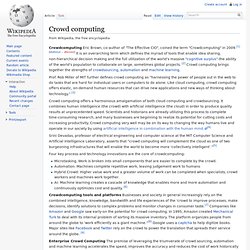
Prof. Rob Miller of MIT further defines crowd computing as “harnessing the power of people out in the web to do tasks that are hard for individual users or computers to do alone. Like cloud computing, crowd computing offers elastic, on-demand human resources that can drive new applications and new ways of thinking about technology.” [3] Crowd computing offers a harmonious amalgamation of both cloud computing and crowdsourcing. Machine learning. Software agent. In computer science, a software agent is a computer program that acts for a user or other program in a relationship of agency, which derives from the Latin agere (to do): an agreement to act on one's behalf.
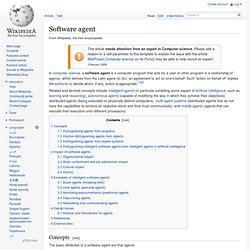
Such "action on behalf of" implies the authority to decide which, if any, action is appropriate.[1][2] Related and derived concepts include intelligent agents (in particular exhibiting some aspect of artificial intelligence, such as learning and reasoning), autonomous agents (capable of modifying the way in which they achieve their objectives), distributed agents (being executed on physically distinct computers), multi-agent systems (distributed agents that do not have the capabilities to achieve an objective alone and thus must communicate), and mobile agents (agents that can relocate their execution onto different processors).
Concepts[edit] The basic attributes of a software agent are that agents Nwana's Category of Software Agent Distinguishing agents from programs[edit] Mathematicians Predict the Future With Data From the Past. Peter Turchin.
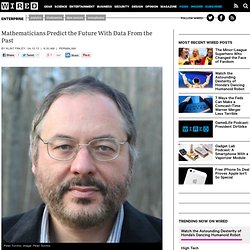
Image: Peter Turchin. In Isaac Asimov’s classic science fiction saga Foundation, mathematics professor Hari Seldon predicts the future using what he calls psychohistory. Drawing on mathematical models that describe what happened in the past, he anticipates what will happen next, including the fall of the Galactic Empire. Cleverbot.com - a clever bot - speak to an AI with some Actual Intelligence? Why Cognition-as-a-Service is the next operating system battlefield. The Semantic Web may have failed, but higher intelligence is coming to applications anyway, in another form: Cognition-as-a-Service (CaaS).
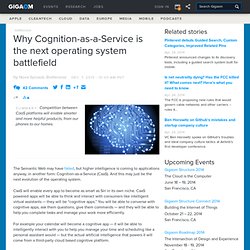
And this may just be the next evolution of the operating system. CaaS will enable every app to become as smart as Siri in its own niche. Cognitive Machines Offer Many Benefits to Humanity. Building cognitive machines that process information the same way a brain does has been the dream of neuroscientists for more than 50 years.
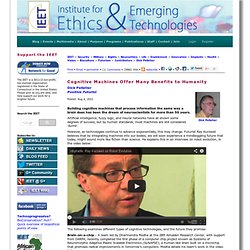
Artificial intelligence, fuzzy logic, and neural networks have all shown some degrees of success, but by human standards, most machines are still considered ‘dumb’. However, as technologies continue to advance exponentially, this may change. Futurist Ray Kurzweil believes that by integrating machines into our bodies, we will soon experience a mindboggling future that today, might sound more like fiction than science. He explains this in an interview on robot evolution, in the video below: The following examines different types of cognitive technologies, and the future they promise: Pattern recognition. Pattern recognition algorithms generally aim to provide a reasonable answer for all possible inputs and to perform "most likely" matching of the inputs, taking into account their statistical variation.
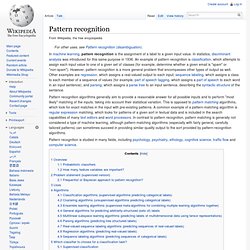
This is opposed to pattern matching algorithms, which look for exact matches in the input with pre-existing patterns. A common example of a pattern-matching algorithm is regular expression matching, which looks for patterns of a given sort in textual data and is included in the search capabilities of many text editors and word processors.
In contrast to pattern recognition, pattern matching is generally not considered a type of machine learning, although pattern-matching algorithms (especially with fairly general, carefully tailored patterns) can sometimes succeed in providing similar-quality output to the sort provided by pattern-recognition algorithms. Overview[edit] Probabilistic classifiers[edit] They output a confidence value associated with their choice. . Pattern Recognition on the Web. Pattern recognition (psychology) The incoming sensory information is compared directly to copies (templates) stored in the long term memory.
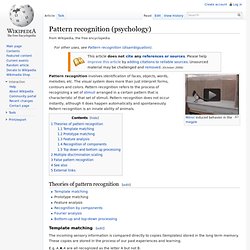
These copies are stored in the process of our past experiences and learning. E.g. A A A are all recognized as the letter A but not B. Anti-pattern. Trees to Network.... Junto_blueprint_gen002.png (Image PNG, 1024x1368 pixels) Thinkbase - Message. Thinkbase: Mapping the World's Brain. If Freebase is an "open shared database of the world's knowledge," then Thinkbase (found via information aesthetics) is a mind map of the world's knowledge.
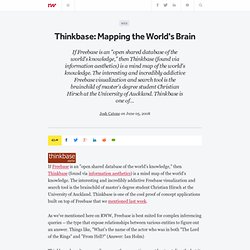
The interesting and incredibly addictive Freebase visualization and search tool is the brainchild of master's degree student Christian Hirsch at the University of Auckland. Thinkbase is one of the cool proof of concept applications built on top of Freebase that we mentioned last week. As we've mentioned here on RWW, Freebase is best suited for complex inferencing queries -- the type that expose relationships between various entities to figure out an answer. Things like, "What's the name of the actor who was in both "The Lord of the Rings" and "From Hell? " (Answer: Ian Holm) Thinkbase doesn't necessarily answer those questions -- at least not directly, but it does allow people to visually explore the relationships that Freebase can expose.
A Potential Federation of Emergent Platforms – Memetic Cartography. About Metamaps.cc Metamaps.cc is a free and open source web platform for changemakers, innovators, educators and students. It enables individuals and communities to build and visualize their shared knowledge and unlock their collective intelligence. We're creating tools to help connect people, resources and ideas with rich detail and weave those relationships into actionable insights and stories. The platform is evolving for a range of applications amidst a growing network of designers, developers, practitioners, entrepreneurs, and artists.
Metamaps.cc is created and maintained by a distributed, nomadic community comprised of technologists, artists and storytellers. Quick Reference Guide Topics. A-Potential-Federation-of-Emergent-Platforms.jpg (Image JPEG, 4794x3287 pixels) - Redimensionnée (24%) Data 2 Wisdom - D.I.K.W. Collective Wisdom Initiative.org. The Spirit of the Internet - Synopsis. Synopsis of The Spirit of the Internet Written by Lawrence Hagerty with the non-technical reader in mind, The Spirit of the Internet explains in everyday language how the Internet works, who is in charge, and some of its future possibilities. It also describes different aspects of "spirit," as manifest in the Internet community. Throughout the book,speculations about the Internet, the noosphere, virtual reality, shamanic plants, and other seemingly unrelated domains are woven into a fascinating tapestry of thought about the evolving Gaian consciousness that is beginning to envelop the planet.
[1208.4091] Wisdom of groups promotes cooperation in evolutionary social dilemmas. PhiloComp: Philosophy and Computing. Welcome — LOD2 – Creating Knowledge out of Interlinked Data. Memetic Engineering. Memetic [meh-met-ik] engineering is a term developed and coined by Leveious Rolando, John Sokol, and Gibran Burchett while they researched and observed the behavior of people after being purposely exposed (knowingly and unknowingly) to certain memetic themes. The term is based on Richard Dawkins’ theory of memes (a proposed basic unit of cultural information). Memetic engineering refers to the process of developing memes, through ‘meme-splicing’ and ‘memetic synthesis,’ with the intent of altering the behavior of others in society or humanity; the process of creating and developing theories or ideologies based on an analytical study of societies, cultures, their ways of thinking and the evolution of their minds; and the process of modifying human beliefs, thought patterns, etc.
According to the theory, the effect a meme has on society is based on the application of the meme after understanding the qualities essential to the meme. Tutorial on Using Amazon Mechanical Turk (MTurk) for HCI Research. Distributed thinking. A distributed thinking project is similar to distributed computing except that the human computer-user performs the relevant tasks. The tasks usually being unsuitable or extremely difficult for computers but very easy for humans. Examples include pattern recognition, proofreading, and certain types of error checking. Projects[edit] BossaIntro – BOINC. Bossa is an open-source software framework for distributed thinking - the use of volunteers on the Internet to perform tasks that use human cognition, knowledge, or intelligence.
Bossa minimizes the effort of creating and operating a distributed thinking project. It provides a project web site, hosted on your Linux server, where volunteers go to perform tasks and to interact with other volunteers. All you need to supply are PHP scripts to generate, show, and handle tasks. Proceedings Template - WORD. E-guestbook: David McCandless. DIKWchain.pdf (Objet application/pdf) Abaque de Régnier. Un article de Wikipédia, l'encyclopédie libre. 撥亂反正. Knowledge extraction. Knowledge extraction is the creation of knowledge from structured (relational databases, XML) and unstructured (text, documents, images) sources.
"A bad plan is better than no plan" Wisdom of Crowds. Stigmergy. Spontaneous order. Norman Barry, The Tradition of Spontaneous Order. Word & text monitoring. Theorie de l'information.pdf. Information theory. Overview[edit] Mining Data-text-web. [1205.2026] Complexity and Information: Measuring Emergence, Self-organization, and Homeostasis at Multiple Scales. On genes, memes, bemes, and conscious things. As human memory, personality, values, and other attributes are increasingly being captured in cybernetic form, they are becoming virtual entities of their own. 5 Transformational Forces That Should Be Driving The Social Sector (But Aren’t) Hybrid Wisdom Labs. Hybrid Wisdom app. Computers match humans in understanding art. Understanding and evaluating art has widely been considered as a task meant for humans, until now. Computer scientists Lior Shamir and Jane Tarakhovsky of Lawrence Technological University in Michigan tackled the question "can machines understand art?
" The individual and social dynamics of knowledge sharing: an exploratory study. Human-based computation. Human-based computation (HBC) is a computer science technique in which a machine performs its function by outsourcing certain steps to humans. This approach uses differences in abilities and alternative costs between humans and computer agents to achieve symbiotic human-computer interaction. How Twitter Gets In The Way Of Knowledge. Information retrieval. [0807.0023] Automatic Metadata Generation using Associative Networks. Category:Information retrieval.